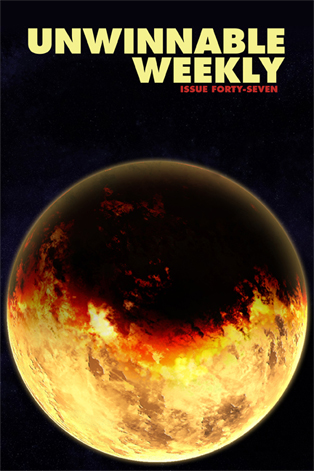
Bang! Bang! Bang!
 The following is a reprint from Unwinnable Weekly Issue Forty-Seven. If you enjoy what you read, please consider purchasing the issue or subscribing.
The following is a reprint from Unwinnable Weekly Issue Forty-Seven. If you enjoy what you read, please consider purchasing the issue or subscribing.
———
Reid McCarter: Hey, Patrick. What’s Shooter? I’ve been hearing about it everywhere.
Patrick Lindsey: Shooter is an anthology of critical essays about, well, shooters. Believe it or not, a critical anthology about shooters makes a weird sort of paradoxical sense. Shooters are simultaneously the most popular genre of videogame and the most reviled. Few other types of games have carried the medium of videogames so far forward into the public consciousness while also building up a dedicated contingent of people who are opposed to these games on a conceptual level.
The idea that shooters are somehow baser, less critically interesting or “less evolved” than other genres of games is not uncommon, though it couldn’t be more wrong. Yes, the suite of interactions available to players in shooter games tends to be smaller and the mechanical and level design tends to be simpler in shooters than, say, in world-sprawling role-playing games, but that’s not to say that these games are in any way shallow or crude. On the contrary — the immediacy and severity of the act of digitally shooting someone is an arena that is rife with the capacity for social, political and cultural commentary. By stripping away extraneous layers of mechanical and narrative padding, what we are left with the shooter is just the chassis—lean and Spartan in its efficiency.
In his book Scarydarkfast, Dan Pinchbeck talks about what developers call “affordances” — things that players are able to do in a game — as a means of comparing and contrasting different titles or different genres. By this very one-dimensional standard, shooters appear, at least on paper, to be among the simplest games out there — in many instances, there aren’t any meaningful player interactions possible beyond “move” and “shoot.”
Why, then, do shooters seem to dominate the popular videogame conversation?
R.M.: Probably because people love the immediate, bone-deep satisfaction of pointing at something and having it either fall down or explode. I mean, there’s a lot of history to it. There’s the essay by David Heineman in the book that starts off by looking at where shooters came from, pre-videogames — how they were already popular as boardwalk attractions long before computers existed — and then you can go back even further to the long tradition of humans loving to fire arrows at targets or shotguns at ducks and clay pigeons. There’s something about shooting, regardless of context, that appeals to people. It’s in our DNA. And I think that goes a long way toward explaining why videogames centred on the act of shooting are so popular — why the genre plays such an outsized role in the medium.
That said, I think it’s pretty common for people who are non-violent to have a difficult time reconciling themselves to how enjoyable it is to shoot things because it’s a fundamentally aggressive act. And it is a simple gameplay mechanic, not nearly as thoughtful as managing numbers in RPGs, thinking out the solutions to puzzles in adventure games, or micro-managing multiple streams of information in strategy titles. So, it makes a certain amount of sense that they’re considered “less evolved” like you put it. The association with violence and simplicity makes people think of the genre as barbaric and that idea is definitely helped along by the fact that so many mainstream, big budget, summer blockbuster-style games are shooters prone to celebrating violence pretty mindlessly.
But, obviously both of us see something valuable in the genre aside from all of that. I won’t speak for you, Patrick, but I know we’ve talked about how the sheer popularity of shooters makes them valuable as a reflection of the cultural values of those who make them and those who buy them in such huge quantities. I think any genre that dominates so much of its medium is interesting. Like, I love playing shooters for some of the reasons listed above, but I also love reading and writing about them because I think even the stupidest of them usually says something about the time and place in which it was made.
P.L.: If shooters are, as you’re saying, cultural artifacts, then Shooter is a sort of time capsule that captures the current state of the videogame industry, from both a development and a player perspective. This era in particular is interesting because we’re starting to see a divergence in the genre. On the one hand you have your Call of Dutys and your Battlefields — games that toe the line of the status quo without enough self-awareness to fill a can of Mountain Dew. Games that exist essentially as mindless entertainment. On the other hand are games like Spec Ops: The Line or Bulletstorm that use shooters as a jumping off point to actually say something about the nature of these interactions we’re so enraptured by.
But even games that think they aren’t saying anything particularly profound can, usually in spite of themselves, say quite a lot about the cultures, people and social conditions that produced them. In this sense, shooters are less about their subject matter and more about us as people who consume them. We know ancient Roman society was steeped in politics and social hierarchy because of writers like Plutarch who have given us a window into that world; in 200 years, people may very well deduce (correctly, mind you) that Western society is imperialistic and xenophobic because of games like Modern Warfare.
But that’s not to say that there’s anything wrong with a game existing solely for entertainment value. There’s something to be said for a game that is, above all else, just really well executed — it’s why Gears of War is so interesting despite containing some of the most sophomoric writing in modern games. The beauty of the shooter is that developers can take either of these approaches — or both. Games give us a way to abstract the primal, macabre enjoyment associated with shooting things and transplant it into a form that’s completely innocuous but makes us feel powerful at the same time. I guess the question is, is violence a thing that’s worth inspecting on a deeper level?
R.M.: Always. I think violence, especially for those of us lucky enough to live in relatively peaceful circumstances where it’s easier to ignore, is incredibly important to examine. It gets hard for anyone who habitually plays shooters — especially multiplayer shooters where the bulk of the narrative context found in a “story mode” is stripped away — to not find themselves thinking about what they’re doing on some level. Like you said, these games allow us to indulge the “primal enjoyment” of shooting stuff without any immediate physical consequence. But (especially with the ever increasing audiovisual fidelity of videogames) it eventually becomes impossible to see the burst heads and bloody corpses that are part of most every shooter as a real abstraction. We have to engage with the joy we take in inflicting digital violence on digital humans eventually.
And that’s where I think you get games like Spec Ops: The Line and the many, many articles about shooter violence from — this need to dissect our fascination with the genre. Most people who play a lot of games have a moment where someone — a friend, parent, partner, etc. — who doesn’t know much about the medium looks over at the screen and asks why you’re having so much fun killing people over and over and over again. That sort of thing always stuck with me. If your roommate asks you to turn down the TV because she’s trying to sleep and all she can hear are gunshots and screams coming from a source of entertainment you plug hundreds of hours into, maybe it’s worth taking a step back and thinking about.
That sounds like I’m condemning shooter violence, but I’m really not. There are a lot of fucked up things encouraged by videogames — compulsive behaviors, skewed views on race, gender, sexuality and global politics — but the job of the critic is to dive into these areas and bring back something of note that maybe encourages players to think a bit differently about what they’re into. So, yeah, I suppose that’s a long-winded way of saying that shooter violence is definitely worth analyzing. And, while not every essay in Shooter is about violence, I’m hopeful that the book at least shows the value of engaging with these games a bit more fully than has always been the case in the past.
P.L.: I think one of the most critically interesting thing about shooters for me is how so few people view them as critically interesting. The gaming landscape is practically swimming in shooter titles and yet we so rarely stop to give these titles the consideration that they’re worthy of. Shooters have a bad rap, notorious for being violent, mindless, bro-ish havens of neoconservative values. But while there are a fair number of games in the genre that fit that bill, to write off the enormous universe of other titles that explore very human themes in unique ways is a mistake.
Criticism isn’t just about pointing out the mistakes or the bad parts of a given medium or title. It’s a process of pulling our media out of a vacuum and trying to determine what the creators are trying to say and how successful they are in that endeavor. The ultimate hope isn’t to tear down popular media, but rather the opposite. Art and the culture that produces it are intrinsically linked. Not only does criticism benefit greatly from a deep understanding of the cultural and societal factors that contribute to a media’s creation, but in better understanding the role that our entertainment has in shaping our ideals, we can be better positioned to make crucial observations about our world as a whole as well.
 R.M.: Yeah, that’s the great thing about criticism. It expands our views. It might sound hyperbolic (or self-serving?) to go on and on about the value of this sort of work, but it’s something I really believe in. It was a real revelation to first encounter the wealth of critical writing about literature back when I was in university — to go on to find similar work about film and music — and it’s fantastic to see the same thing happening (with greater and greater visibility) in videogames over the last however many years. Probably the most continually interesting part of being engaged in this medium is seeing critical writing become more prevalent — to get to read game reviews and articles that make me consider things I’ve played in a different way.
R.M.: Yeah, that’s the great thing about criticism. It expands our views. It might sound hyperbolic (or self-serving?) to go on and on about the value of this sort of work, but it’s something I really believe in. It was a real revelation to first encounter the wealth of critical writing about literature back when I was in university — to go on to find similar work about film and music — and it’s fantastic to see the same thing happening (with greater and greater visibility) in videogames over the last however many years. Probably the most continually interesting part of being engaged in this medium is seeing critical writing become more prevalent — to get to read game reviews and articles that make me consider things I’ve played in a different way.
Editing this book has definitely done this, too. I may have played games like Fallout 3 or Wolfenstein: The New Order before, but I didn’t get the same things out of them as Holly Green or Javy Gwaltney did. Because they, and every writer, has a different worldview than my own. No two people have grown up the same way, learned the same things, or experienced the world in the same way as one another. That’s what makes a variety of opinions interesting — and necessary — for games writing. I think, too, that a genre like the shooter (which just about everyone who plays games probably has some kind of opinion about) suits this well. When you get a bunch of different people together and ask them to pick a game from such a big category to write about, you’re bound to get some pretty varied work as the result.
So, I guess all of these paragraphs probably do a pretty good job of explaining what Shooter is. Right? Did we leave anything out?
P.L.: I honestly believe — and I’m not just saying this because we’ve been working on this book for the past 10 or so months — that Shooter represents the future of what critical game writing can be. This is important not just for the talented writers who share their valuable insights into games and game culture, but for the future of the whole medium, too.
It’s no secret that critical game writing has struggled to find a foothold in the past few years, at least in the world of online publications. But that’s not to say that there isn’t a wealth of amazing writing out there. Shooter is just one of an ever-growing number of thought-provoking, insightful collections of writing about some of our favorite pieces of entertainment. Not only is game criticism edifying in and of itself, but if we really make an effort to nurture critical writing and help it grow, it can help us to better connect with our games in more meaningful ways.
R.M.: I’m all the way with you on that. Support independent games criticism. Buy Shooter. It’s a good thing to do. That’s the new advertising line by the way: “Buy Shooter. It’s a good thing to do.”





